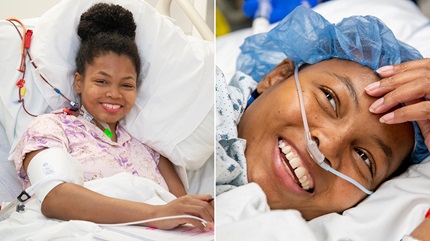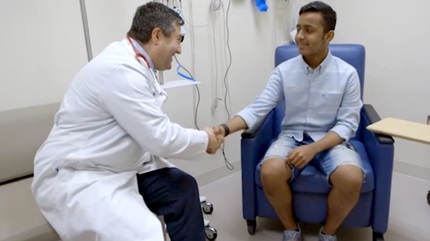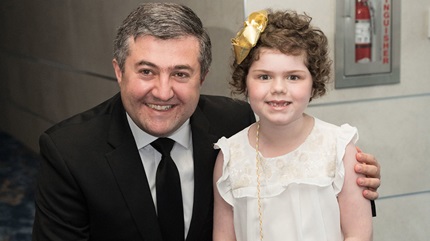Overview
Cleveland Clinic Children's Blood and Marrow Transplant (BMT) Program treats children and adolescents who require a blood or marrow transplant to replace stem cells to treat their illness. BMT is used as treatment for a variety of diseases, including certain types of pediatric cancer, disorders of the blood and immune system (the system that fights infection) as well as a wide variety of other rare disorders and syndromes.
Cell therapy is a rapidly advancing field in medicine that uses living cells as treatment instead of traditional drugs. In cancer care, cell therapies like CAR T-cells involve reprogramming a patient’s own immune cells to better recognize and attack tumor cells. For people with weakened immune systems—such as those undergoing cancer treatment—similar approaches can help boost or replace immune function to fight infections that their bodies can’t control on their own. In gene therapy, abnormal genes can be edited or replaced within cells before returning them to the patient, offering the possibility of correcting inherited diseases at their source. Together, these innovations represent a new generation of personalized, precise, and potentially curative treatments.
Program benefits
- Comprehensive care: Our program is designed to support our patients and their parents through every step of the transplant process; starting with quick entry into the program. Our experienced team works together to provide comprehensive, individualized care for each patient. We have a dedicated BMT nurse coordinator that manages time-sensitive care coordination of critically ill children who require either an autologous or an allogeneic transplant as the best chance for survival.
- High level care: Families who come to Cleveland Clinic Children’s for their child’s BMT will receive the highest level of innovative medical, nursing, and supportive care services from a dedicated and highly experienced team. Our team work collaboratively with a variety of clinical experts for the specific management of your child’s condition before, during and after transplant. Your child’s treatment group will be actively involved in the oversight of every aspect of their care and will discuss their needs and treatment on a regular basis. Each week, the team reviews the list of patients currently receiving treatment and makes plans for the upcoming week and month to ensure well-coordinated care.
- Multidisciplinary care: Our team consists of experts in the treatment of pediatric cancer, as well as diseases and disorders of the blood and immune system. The team includes physicians, nurse practitioners, a nurse coordinator, social worker, psychologist, inpatient and outpatient registered nurses, nutritionists and child life specialists. We also have access to the resources and expertise of the Taussig Cancer Center’s Adult BMT program.
Accreditations
Blood and Marrow Transplant Accreditations
- Foundation for the Accreditation of Cellular Therapy (FACT)
As a parent, FACT accreditation can assure you that the healthcare organization you choose for your child's care is committed to providing quality patient care.
Blood and Marrow Transplant Associations
- Blood and Marrow Transplant Clinical Trials Network (BMTCTN)
The Blood and Marrow Transplant Program collaborates with the BMT Clinical Trials Network (BMT CTN). BMT CTN was established because of a critical need for multi-institutional clinical trials focused directly on improving survival for patients undergoing hematopoietic cell transplantation (HCT). - Center for International Blood and Marrow Research (CIBMTR)
The Center for International Blood and Marrow Transplant Research (CIBMTR) collaborates with the global scientific community to advance hematopoietic cell transplantation (HCT) and cellular therapy research worldwide. - National Marrow Donor Program (NMDP)
Our program is a National Marrow Donor transplant center. - Radiation Injury Treatment Network (RITN)
The RITN was developed to respond to a potential disaster resulting in mass casualties with marrow toxic injuries from ionizing radiation exposure or other hazardous material. - Southwest Oncology Group (SWOG)
SWOG is a cancer research cooperative group that designs and conducts multidisciplinary clinical trials to improve the practice of medicine in preventing, detecting, and treating cancer, and to enhance the quality of life for cancer survivors.
Progenitor Cell Processing Laboratory Accreditations
- College of American Pathologists (CAP)
CAP is the leading organization of board-certified pathologists fosters and advocates excellence in pathology and laboratory medicine worldwide. - Clinical Laboratories Improvement Amendment (CLIA)
The Centers for Medicare & Medicaid Services (CMS) regulates all laboratory testing (except research) performed on humans in the U.S. through the Clinical Laboratory Improvement Amendments (CLIA).
Allogen Laboratories Accreditations
- American Society for Histocompatibility & Immunogenetics (ASHI)
The American Society for Histocompatibility and Immunogeneticsis an international society of professionals dedicated to advancing the science, education and application of immunogenetics and transplant immunology.
Blood Bank Accreditations
- American Association of Blood Banks (AABB)
AABB advances the practice and standards of transfusion medicine and cellular therapies to optimize patient and donor care and safety.
What We Treat
Bone marrow is the soft, spongy center of the bone that contains the stem cells that produce white blood cells, red blood cells, and platelets. Diseased or damaged blood cells interfere with the production of healthy blood cells and may build up in the body and invade other tissues. A bone marrow transplant can replace unhealthy cells with healthy cells, increasing the chances of a cure.
Cells used in blood and marrow transplant, called stem cells, are obtained from:
- Bone marrow – tissue inside the bone
- Peripheral blood – cells that make up the blood
- Cord blood - cells from the umbilical cord
Many diseases may be treated by transplant including those listed below. We can also treat myelodysplastic syndrome, inborn errors of metabolism, and other acute and chronic leukemias, bone marrow failure syndromes, and immunodeficiencies and immune dysregulation diseases.
Malignant Diseases
- Acute lymphoblastic leukemia (ALL)
- Acute myelogenous leukemia (AML)
- Brain tumors
- Chronic myeloid leukemia (CML)
- Ewing’s tumor
- Hodgkin’s disease
- Juvenile myelomonocytic leukemia (JMML)
- Myelodysplastic syndrome (MDS)
- Neuroblastoma
- Non-Hodgkin’s lymphoma
- Relapsed germ cell tumors
- Soft tissue sarcoma
Non-malignant Diseases
- Aplastic anemia
- Adrenoleukodystrophy
- Crohn’s disease
- Common variable immune deficiency (CVID)
- Diamond-Blackfan anemia
- Fanconi’s anemia
- Hemophagocytic Lymphohistiocytosis (HLH)
- Hurler’s syndrome
- IPEX syndrome
- Krabbe disease
- Langerhans cell histiocytosis (LCH)
- Multiple sclerosis
- Severe congenital neutropenia
- Sickle cell disease
- Systemic sclerosis
- Severe combined immunodeficiency (SCID)
- Thalassemia
- Wiskott Aldrich syndrome
The decision about the type of transplant that will be done depends on your child’s disease.
- Autologous transplant – If a child is to receive an autologous stem cell transplant, this means he or she will be getting their own cells for the transplant.
- Allogeneic transplant – If a child is to receive an allogeneic transplant, this means he or she is getting stem cells from either a family member or an unrelated donor. Allogeneic transplants may use bone marrow, cord blood, or peripheral stem cells depending on the donor and your child’s specific needs.
CAR T-Cell Therapy
- The therapy involves removing certain immune system cells (T cells) from a patient’s blood and re-engineering those cells in a lab so that they can produce a gene that targets a particular receptor on cancer cells.
- Those engineered cells are then infused back into the patient’s blood through an IV, where they multiply and get to work finding and destroying cancer cells.
- Program participates in multiple clinial trials for CAR T-Cell Therapy.
The BMT Process
Unlike organ transplants, blood and marrow transplants are not surgical procedures. They are more similar to blood transfusions. The challenging part of the BMT process is managing the complications following the transplant, when the patient is extremely susceptible to infection.
The typical BMT process is laid out below.
Pre-transplant
Several important steps take place long before the transplant occurs.
- Pre-transplant consultation: You and your child will meet with one of the transplant physician’s to discuss the potential role of bone marrow transplant in the treatment of your child’s illness.
- Finding a donor: The medical team will look for a relative, or a donor from the National Marrow Donor Program or cord blood registries. With certain diseases, we may utilize your own bone marrow for the transplant.
- Pre-transplant evaluation: Before the BMT process begins, your child will need to have an extensive evaluation to determine his or her eligibility for transplant. This evaluation will happen over several visits and includes lab testing, imaging, and consults with other services.
- Harvesting stem cells: Once a donor is identified, stem cells are harvested. If the donor is a relative, our team will meet with them separately to review the donation process.
- Pre-transplant conference: You will meet with one of the transplant physicians to discuss your child’s workup evaluation results and finalize a treatment plan.
Transplant
When transplant time arrives:
- Preparation regimen: Your child will be admitted to the BMT unit a few days prior to transplant to receive a preparatory regiment that includes high doses of chemotherapy and/or radiation with the appropriate supportive treatment and diagnostic laboratory workup.
- Transplant day (Day 0): During the transplant day, stem cells that have been previously collected are given to the patient. The transplant itself occurs in the patient’s room and is similar to a blood transfusion.
Post-transplant
During the weeks after transplant day, the patient’s body is unable to produce white blood cells increasing his or her risk of infection. Depending on the transplant type, it can take several weeks for the new stem cells to begin producing enough blood cells to protect the body from germs. During this period, patients are closely monitored in protective isolation on the BMT unit and receive medications to prevent infection until their new “healthy” cells can take over. While waiting on new stem cells to grow into new healthy blood cells, all patients will receive aggressive monitoring and supportive care.
Going home
Your child’s healthcare team will work with you to determine when it is time for your child to leave the hospital. This varies depending on the type of transplant and how patients are feeling and progressing after the BMT. Patients should expect frequent appointments with their transplant team for at least the first 100 days post-transplant. It is important to know that full recovery can take months or even years beyond that time. If your child is treated outside of Cleveland Clinic Children’s, our team will determine when it is safe to return to local care.
Depending on the type of transplant your child receives, you may need to stay within a one-hour commute to Cleveland Clinic Children’s for 60 to 100 days following the procedure. Some insurance companies provide a travel and lodging benefit that covers at least a portion of these expenses. If you need help arranging accommodations, our social worker is available to assist you in working with support services.
Our team will monitor your child’s health and well-being with comprehensive annual follow-ups after your child goes home.
Becoming a bone marrow donor
Patients all over the world facing bone marrow transplant procedure need people like you to become a bone marrow donor, to donate blood stem cells or cord blood, or to help in other ways. All bone marrow transplant survivors have people like you to thank for their new opportunities. Learn more about how you can help.
Our Team
Looking for a pediatric oncologist/hematologist?
Find a ProviderAdditional providers
- Kathy Bielek, CNP
- Preston Epling, CNP
- Rachel Fisher, CNP
- Miriam Rigas, PA
- Minna Schwart, PAv
- Grace Statdfield, PA
- Blanca Daniel, RN
- Jessica Windahl, RN
Appointments
Patients of our Blood and Marrow Transplant Program can be seen at Cleveland Clinic Main Campus:
Cleveland Clinic Main Campus
8950 Euclid Ave
R Building
Cleveland, OH 44195
For more information or to make an appointment, please call 216.444.5517.
Note: All patients looking to schedule virtual visits must have a Cleveland Clinic Medical Record Number (MRN). If you do not have a Cleveland Clinic MRN, please call the appropriate number below and they will be able to assist you in getting your record created.
- USA: 216.444.5437
- International (including Canada): 216.444.6404




